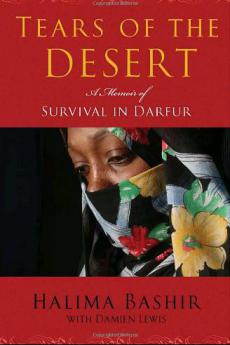Halima the healer
review of “Tears of the Desert” by Halima Bashir, co-authored with Damien Lewis, published by One World/Ballantine, 2009
The book “Tears of the Desert”, written by Halima Bashir in cooperation with journalist Damien Lewis and published in 2009 by One World, is something more than a piece of war testimony: it is the tale of how the protagonist, since her birth in the very poor region of Darfur, led a difficult life, being infibulated at only 8, in a war-torn country, and yet achieved the mission intrinsic to her name (Halima was a woman who had healed her father before she was born) and fulfilled herself as a doctor and a woman able to bring balm on the wounds of the more and more violent world we live in. A woman who was awarded the Politkovskaja prize and who, on 6 March, will plant a tree with Gariwo in the Garden of the Righteous of Milan, in the presence of the authorities, students and citizens.
The book first introduces Halima in London, lulling her baby, a child who could have not been born, if it had been for the consequences of the mutilations undergone in her childhood and of the rape that was inflicted to her by the janjaweed militiamen to punish her for her reports about the crimes against women and children.
But let’s follow the story’s order. First of all, Halima tells us about her region, ravaged by war and yet a land she keeps loving, against all odds. “Darfur. I know this sounds to you as a blood-soaked word, full of suffering. A name that evokes the dreadful images of gloomiest horror and endless pain. Grief and cruelty at such a stage that it is nearly unconceivable in the eyes of the civilised world. To me, instead, Darfur has a completely different meaning: it was and still is that irreplaceable, immeasurable joy that is called ‘home’”.
Halima was born into the zaghawa tribe, “a proud warrior people of black Africans, the most generous and welcoming towards foreigners”. She grew up into a family that loved her very much, although it was prey of archaic traditions and had her infibulated. At any rate, her father wanted her to study. For her, the years of education were very hard. In the country, which is a region of Sudan, there are enormous disparities between the dominating Arabs and the black, who are often marginalised and enslaved. This is reflected also in the relationship among pupils and between them and the teachers. Distances from home to schools are long. Many jobs, done the old way, are quite heavy. The phantom of famine looms at the horizon of Darfur – a region which has already endured that. Since the years 2000es, the country is at war, which at the beginning Halima’s father welcomes as a necessary rebellion of blacks against the Arabs. Halima herself grows up thinking that, alas, she wants peace, but “unless we rebel, we are crushed”. Eliminated. Annihilated for being “negro dogs”. When he bravely dares speak to journalists about what she sees in the emergency room where she works immediately after graduation – maimed bodies of people often denying the cause of their wounds is war, corpses which inexorably all belong to members of her people, and above all little girls raped – she is abducted by some men in uniform who first declare they want to question her and then rape her for days, telling her right that: “Negro bitch. ‘Do you know what rape is?’. His face is a mask of hatred: his eyes close to mine, fetid soldier breath. ‘Do you believe you know about it because you are a doctor? But you know nothing. We do know, we are the experts in this subject matter..”. Today Halima is political refugee in England where she lives with her family.
You do not have to buy her book only because it is well-written. Or because you are going to help the associations committed to helping the populations in Darfur. It is a beautiful book, rich with characters – the energetic Grandma of Halima’s, her school mates, her boss at the emergency room who assists people of all colours and ethnic groups despite being an Arab like the oppressors, her witty father, her patients before the war who demand to be visited by her although they are sane, and more. It is also rich at civil passion, as proves the fact that she reports Islamist terror, war, the rapes against women and little girls, the archaic and violent practices against the latter’s body and so on. And it is neatly subdivided into chapters, as for instance “The faculty of Medicine”, “Voices of war”, “The doctor of rebels”, “Escape from Darfur”, each telling about a different part of her eventful life on the string of hope, beyond hatred. The work of an attentive editorial staff, that Halima thanks at the book’s beginning, and the journalistic skills of Damien Lewis, make this work a valuable literary piece of testimony besides a precious source of documentation. A work that shows us the value and capability to resurrect as a phoenix of every human being, even the most despised and marginalised one.



